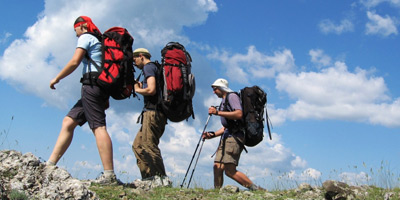How to Prevent Summer Sports Injuries and Enjoy the Great Outdoors
Monday, July 18th, 2011 Summer sports are a great way to enjoy warm temperatures and clear skies, but they can also lead to a variety of sports-related injuries. Common summer activities like hiking, swimming, biking, and running can certainly increase your energy and make you feel great. But, did you know that sports-related injuries are most likely to occur in the summer? Sprains, strains, dislocations, fractures, and joint injuries do happen, but oftentimes they can be prevented by taking a few common sense steps to ensure safety while you enjoy outdoor activities.
Summer sports are a great way to enjoy warm temperatures and clear skies, but they can also lead to a variety of sports-related injuries. Common summer activities like hiking, swimming, biking, and running can certainly increase your energy and make you feel great. But, did you know that sports-related injuries are most likely to occur in the summer? Sprains, strains, dislocations, fractures, and joint injuries do happen, but oftentimes they can be prevented by taking a few common sense steps to ensure safety while you enjoy outdoor activities.
Wear Proper Footwear
Whether you’re hiking Yosemite or hitting the local tennis court, you need the right footwear to prevent potential sports injuries such as ankle sprains and plantar fasciitis. It’s always a good investment to purchase shoes from a retailer with salespeople who take the time to measure your feet and help you choose footwear that fits and is appropriate for the activity that you’ll be participating in. Don’t forget to choose your socks wisely, too. Socks can dramatically affect how shoes fit and how you are able to move in your shoes. If you exercise on a regular basis, it’s also important to remember that shoes wear out quicker than you think and need to be replaced on a consistent basis.
Don’t Forget the Protective Gear
Activities like rollerblading and biking can be especially fun in the summer. However, they are commonly the cause of more serious sports injuries including fractures. While it may be tempting to just hop on that bike without a helmet or throw on the skates without considering knee and elbow pads, they can go a long way to help prevent an unexpected injury that could potentially leave you on the sidelines all summer long!
Stop Playing When Something Hurts
The time to stop playing isn’t after hours of muscling through nagging pain. Rather, paying attention to your body and regarding pain as a signal to stop is the smart way to go. Pain could be a sign of a major or a minor injury. It’s always a good idea to get it checked out by your healthcare professional. If it isn’t found to be serious, take the RICE approach – Rest, Ice, Compression, and Elevation. RICE initiated just after a minor injury can help reduce pain and swelling and decrease overall recovery time.
Don’t Overdo It
When temperatures begin to climb, heat-related injuries can occur. Dehydration, heat exhaustion, and heat stroke are all very common during the summer. Your best line of defense is staying adequately hydrated with the right amount of fluids. Of course, your body needs water, but it also need electrolytes, sodium, and minerals, that when depleted, can cause painful muscle cramps and other symptoms. Sports drinks are often the easiest solution for replacing what is depleted during exercise. Of course, you’ll want to avoid caffeine and alcohol which can further cause dehydration. Wearing loose, sweat wicking clothing can also help keep you cool and prevent heat-related illness.
Use Common Sense
Finally, an ounce of common sense can prevent the need for a pound of cure – especially when it comes to summer sports injuries. Allow yourself time to acclimate to heat, and don’t overdo it, especially under the glaring rays of the midday sun. If you feel pain, fatigue, nausea, or just not right, stop exercising and cool off. The goal is to have fun, stay fit, and enjoy the summer. By taking a few preventative steps, you’ll make the most of the season!






